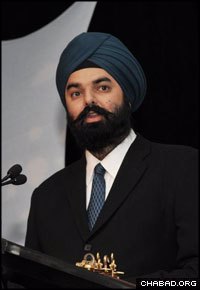Sitting among the government officials and rabbinical leaders who came to the Israeli village of Kfar Chabad to pay their respects to the fallen directors of Mumbai, India’s Chabad-Lubavitch center, the presence of Indian Ambassador Navtej Sarna testified that last week’s slaughter of more than 190 people over the course of 60 hours touched the world in ways unseen.
And judging by the sheer number of Jewish communal memorial services attended by Indian immigrants and people of South Asian descent, Sarna’s appearance Tuesday afternoon was indicative of a strong bond between two communities wounded deeply by terrorism. At a prayer service sponsored by Chabad-Lubavitch of South Texas and the local Jewish Federation, Mr. Gurpaul Singh, a leader of S. Antonio’s Sikh community, told the more than 200 people gathered that Rabbi Gavriel and Rivka Holtzberg, who ran the Mumbai Chabad House for five and a half years, were extraordinary individuals.
“Any act of terror is barbaric and incomprehensible, but it seems particularly inhumane when they go after those that dedicated their lives, a life of sacrifice, to spread the word of G‑d,” said Singh. “These people were learned, and sought to help their neighbors. To see them being victims of this is particularly disturbing.”
In many cities, memorial organizers received calls from local South Asians specifically asking to come so that they could pay their respects.
In Boise, some 80 people drove through blinding fog to pay tribute to the victims at the Chabad Jewish Center of Idaho. A quarter of those who came represented the local Indian-American community. At the ceremony, Rabbi Mendel and Esther Lifshitz led the attendees in lighting one tea light for each of the people killed in Mumbai.
Meanwhile, in the North London suburb of Edgware, eight South Asian residents came to the memorial service organized by the local Chabad House.
Puja, a teacher at the preschool run by Chabad-Lubavitch of Fairfield County in Stamford, Conn., said to the 200 people who came to center’s memorial service Tuesday night that last week’s “attacks were aimed at humanity, prosperity and peace.”
“But their top target was something else: our unity,” she said. “They know that hatred and chaos feed on division. Our message to them is that these tactics have failed, that we’re more united than ever, determined to work together against terror. This unity transcends all barriers of culture, race and country.”

And in New Jersey, state Assemblyman Upendra J. Chivukula, an Indian immigrant, was scheduled to speak at the Dec. 4 nighttime memorial service organized by the Rabbinical College of America – a Chabad-Lubavitch yeshiva in Morristown – the United Jewish Communities of MetroWest and the Jewish Community Center of MetroWest. Other guests scheduled to speak are Newark Mayor Cory Booker, RCA dean Rabbi Moshe Herson, and UJC MetroWest executive vice president Max L. Kleinman.
In S. Antonio, Rabbi Chaim Block, co-director of Chabad-Lubavitch of South Texas, reserved some of his remarks for the South Asian contingent in the filled-to-capacity hall.
“We’re moved that you have come to stand in solidarity with us,” said Block. “This is our common tragedy, and we mourn together.”
Speaking by phone after the event, Singh said that he was honored to be invited.
“I and my fellow Sikhs felt very welcomed,” he related. “There were four different rabbis there, and they each came over before and after the ceremony to personally greet us and make us feel welcome.
“While the occasion was sad and solemn,” he continued, “we definitely felt kinship and unity.”








Join the Discussion